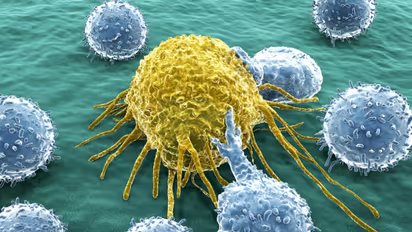Appendix cancer awareness: Why early detection and lifestyle choices matter

Synopsis
By raising awareness and advocating proactive health actions, we can empower people to manage their health and enhance outcomes and quality of life. Our prevention, education, and early intervention activities will help fight appendix cancer and assist individuals in recovery as medical science and treatment develop.
Lifestyle choices significantly impact our overall health and well-being. From diet and exercise to habits such as smoking and alcohol consumption, the decisions we make daily can influence our risk of developing various health conditions. Appendix cancer is a rare and often overlooked type of cancer that can have significant implications for those affected. As one of the less common cancers, it doesn’t always receive the attention it deserves, which can lead to late or missed diagnoses, and can lead to needing more challenging treatments. Raising awareness about appendix cancer is very crucial as early detection and the right surgical treatment can lead to a cure for the disease.
Understanding Appendix Cancer
Appendix cancer originates in the appendix, a small, tube-shaped organ located at the junction of the small and large intestines at the level of cecum. Although the appendix’s exact function is not entirely understood, it is known to play a minor role in the immune system. When cancer develops in this organ, it usually mimics as appendicitis, and most patients are diagnosed as appendicular cancer post-appendicectomy surgery on the pathology specimen. It can also present in other forms, including carcinoid tumours, mucinous adenocarcinomas, and peritoneal cancer. Symptoms often mimic those of more common gastrointestinal issues, such as abdominal pain or constipation, making it easy to overlook or misdiagnose.
Also Read: Neem leaves for sugar patients: Know benefits and how to use
The Importance of Early Detection
Early detection is crucial for managing appendix cancer effectively. Given its rarity and the subtlety of its symptoms, diagnosing appendix cancer early can be challenging. Regular check-ups and paying attention to persistent or unusual symptoms are essential. Healthcare providers may use imaging tests, such as CT scans or ultrasounds, and sometimes surgery to accurately diagnose the condition. The earlier the cancer is detected, the more available treatment options, and the better the chances of successful outcomes.
Treatment Options for Appendix Cancer
Treatment for appendix cancer depends on the type and stage of the cancer, as well as the patient's overall health. Common treatment options include:
- Surgery: The primary treatment for appendix cancer is surgical removal. This may involve the removal of the appendix (appendectomy) and, in some cases, the removal of part of the colon or other nearby tissues. For more advanced cases, surgeons may perform a more extensive procedure to remove affected organs and tissues.
- Chemotherapy: Chemotherapy uses drugs to kill cancer cells or stop them from growing. It may be recommended if the cancer has spread beyond the appendix or if there is a risk of recurrence. The drugs can be administered orally or through intravenous infusion. Sometimes chemotherapy in the form of HIPEC ( Hyperthermic Intraperitoneal chemotherapy) where chemotherapy solution is heated upto 42 – 43 degree centigrade in a specialised machine, and is administered into the abdominal cavity for 60-90 minutes is needed if spread is seen within the abdomen.
- Targeted Therapy: This approach uses drugs or other substances to target cancer cells while minimizing damage to normal cells specifically. Targeted therapy is used in cancer cases with specific genetic mutations or characteristics.
Prevention and Lifestyle Choices
While there is no definitive way to prevent appendix cancer, adopting a healthy lifestyle can help reduce the risk of developing various cancers, including appendix cancer. Key preventive measures include:
- Healthy Diet: Eating a balanced diet rich in fruits, vegetables, and whole grains supports overall health and may help lower cancer risk. Limiting processed foods, red meats, and high-fat diets can also be beneficial.
- Regular Exercise: Engaging in regular physical activity helps maintain a healthy weight and supports overall health. It is associated with a lower risk of several types of cancer.
- Routine Medical Check-Ups: Regular health screenings and consultations with healthcare providers can help in the early detection of health issues, including appendix cancer. Being proactive about your health and discussing any symptoms with your doctor can lead to timely diagnosis and treatment.
- Monitoring Symptoms: Paying attention to persistent or unusual symptoms, such as abdominal pain, bloating, or changes in bowel habits, and seeking medical advice promptly can aid in early detection and treatment.
While appendix cancer may be rare, its implications for those affected are profound. It can affect anyone from young children to old age adults. If symptoms similar to appendicitis ( abdominal pain and fever) occur in age group above 50 years, it is important to get a CT or MRI scan to ensure there are no sinister features of appendix cancer are seen. Specialist surgeons may be needed to do surgery if these are noted.
Emphasizing early detection, making informed lifestyle choices, and prioritizing regular medical check-ups are essential strategies in managing and mitigating the risks associated with this condition.
By fostering awareness and encouraging proactive health measures, we can empower individuals to take charge of their health, ultimately leading to better outcomes and improved quality of life. As we continue to advance in medical research and treatment, our collective efforts in prevention, education, and early intervention will play a pivotal role in combating appendix cancer and supporting those on their journey to wellness.
-Dr Prabhu Nesargikar, Consultant GI, Robotic Surgeon, HCG Cancer Centre, KR Road, Bangalore.
Explore the latest Lifestyle News covering fashion, wellness, travel, Food and Recipes, and more. Stay updated with trending Health News, fitness tips, and expert insights to inspire your daily living. Discover personalized lifestyle trends that keep you stylish and informed. Download the Asianet News Official App from the Android Play Store and iPhone App Store for everything that adds value to your everyday life.